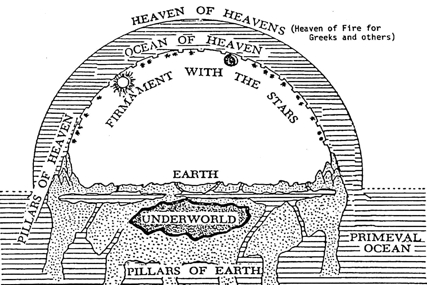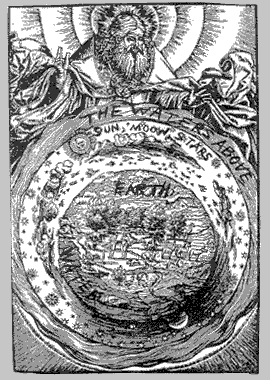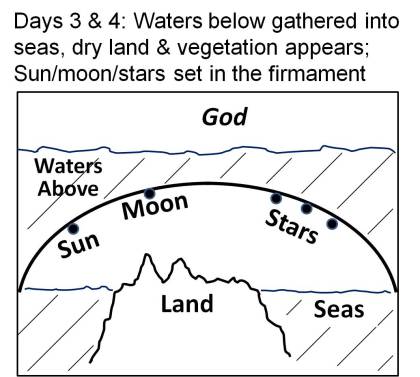The ancient writers did not speak with one voice as the EO claim. The unity is a false unity and found in ritual, not doctrine.
Basil wrote; "What then? After all these efforts were they tired? Did they leave off? Not at all. They are charging me with innovation, and base their charge on my confession of three hypostases, and blame me for asserting one Goodness, one Power, one Godhead. In this they are not wide of the truth, for I do so assert. Their complaint is that their custom does not accept this, and that Scripture does not agree. What is my reply? I do not consider it fair that the custom which obtains among them should be regarded as a law and rule of orthodoxy. If custom is to be taken in proof of what is right, then it is certainly competent for me to put forward on my side the custom which obtains here. If they reject this, we are clearly not bound to follow them. Therefore let God-inspired Scripture decide between us; and on whichever side be found doctrines in harmony with the word of God, in favour of that side will be cast the vote of truth." Letter 189
The question is, whose testimony or witness is true? Your tradition or scripture?
"If we receive the testimony of men, the testimony of God is greater, for this is the testimony of God that he has borne concerning his Son." 1
John 5:9
"For when God made a promise to Abraham, since he had no one greater by whom to swear, he swore by himself,"
Hebrews 6:13
I googled this up for you.
Justin Martyr (wrote after 151): The word of truth is free, and carries its own authority, disdaining to fall under any skilful argument, or to endure the logical scrutiny of its hearers. But it would be believed for its own nobility, and for the confidence due to Him who sends it. Now the word of truth is sent from God; wherefore the freedom claimed by the truth is not arrogant. For being sent with authority, it were not fit that it should be required to produce proof of what is said; since neither is there any proof beyond itself, which is God. For every proof is more powerful and trustworthy than that which it proves; since what is disbelieved, until proof is produced, gets credit when such proof is produced, and is recognised as being what it was stated to be. But nothing is either more powerful or more trustworthy than the truth; so that he who requires proof of this is like one who wishes it demonstrated why the things that appear to the senses do appear. For the test of those things which are received through the reason, is sense; but of sense itself there is no test beyond itself. As then we bring those things which reason hunts after, to sense, and by it judge what kind of things they are, whether the things spoken be true or false, and then sit in judgment no longer, giving full credit to its decision; so also we refer all that is said regarding men and the world to the truth, and by it judge whether it be worthless or no. But the utterances of truth we judge by no separate test, giving full credit to itself. And God, the Father of the universe, who is the perfect intelligence, is the truth. And the Word, being His Son, came to us, having put on flesh, revealing both Himself and the Father, giving to us in Himself resurrection from the dead, and eternal life afterwards. And this is Jesus Christ, our Saviour and Lord. He, therefore, is Himself both the faith and the proof of Himself and of all things. Wherefore those who follow Him, and know Him, having faith in Him as their proof, shall rest in Him. But since the adversary does not cease to resist many, and uses many and divers arts to ensnare them, that he may seduce the faithful from their faith, and that he may prevent the faithless from believing, it seems to me necessary that we also, being armed with the invulnerable doctrines of the faith, do battle against him in behalf of the weak.
ANF: Vol. I, Fragments of the lost Work of Justin on the Resurrection, Chapter I.
Clement of Alexandria (150 - c. 215): The exercise of faith directly becomes knowledge, reposing on a sure foundation. Knowledge, accordingly, is defined by the sons of the philosophers as a habit, which cannot be overthrown by reason. Is there any other true condition such as this, except piety, of which alone the Word is teacher? I think not. Theophrastus says that sensation is the root of faith. For from it the rudimentary principles extend to the reason that is in us, and the understanding. He who believeth then the divine Scriptures with sure judgment, receives in the voice of God, who bestowed the Scripture, a demonstration that cannot be impugned. Faith, then, is not established by demonstration. "Blessed therefore those who, not having seen, yet have believed."
ANF: Vol. II, The Stromata, Book II, Chapter II.""The Knowledge of God Can Be Attained Only Through Faith.
Clement of Alexandria (150 - c. 215): It will naturally fall after these, after a cursory view of theology, to discuss the opinions handed down respecting prophecy; so that, having demonstrated that the Scriptures which we believe are valid from their omnipotent authority, we shall be able to go over them consecutively, and to show thence to all the heresies one God and Omnipotent Lord to be truly preached by the law and the prophets, and besides by the blessed Gospel. Many contradictions against the heterodox await us while we attempt, in writing, to do away with the force of the allegations made by them, and to persuade them against their will, proving by the Scriptures themselves.
ANF: Vol. II, The Stromata, Book IV, Chapter 1.
Lactantius (260-330): For since all error arises either from false religion or from wisdom, in refuting error it is necessary to overthrow both. For inasmuch as it has been handed down to us in the sacred writings that the thoughts of philosophers are foolish, this very thing is to be proved by fact and by arguments, that no one, induced by the honourable name of wisdom, or deceived by the splendour of empty eloquence, may prefer to give credence to human rather than to divine things. Which things, indeed, are related in a concise and simple manner. For it was not befitting that, when God was speaking to man, He should confirm His words by arguments, as though He would not otherwise be regarded with confidence: but, as it was right, He spoke as the mighty Judge of all things, to whom it belongs not to argue, but to pronounce sentence. He Himself, as God, is truth. But we, since we have divine testimony for everything, will assuredly show by how much surer arguments truth may be defended, when even false things are so defended that they are accustomed to appear true. Wherefore there is no reason why we should give so much honour to philosophers as to fear their eloquence. For they might speak well as men of learning; but they could not speak truly, because they had not learned the truth from Him in whose power it was.
ANF: Vol. VII, The Divine Institutes, Book III, Chapter I. See also FC, Vol. 49, The Divine Institutes, Book III, Chapter 1 (Washington D.C.: The Catholic University Press, 1963), pp. 165-166.
Hilary of Poitiers (c 315-67): For he is the best student who does not read his thoughts into the book, but lets it reveal its own; who draws from it its sense, and does not import his own into it, nor force upon its words a meaning which he had determined was the right one before he opened its pages. Since then we are to discourse of the things of God, let us assume that God has full knowledge of Himself, and bow with humble reverence to His words. For He Whom we can only know through His own utterances is the fitting witness concerning Himself.
NPNF2: Vol. IX, On the Trinity, Book I, §18.
Nemesius of Emesa (Late 4th Century): But for us the sufficient demonstration of the soul"(tm)s immortality is the teaching of Holy Scripture, which is self-authenticating because inspired of God. William Telfer, ed.,
The Library of Christian Classics, Vol. IV, Cyril of Jerusalem and Nemesius of Emesa: On the Nature of Man, Chapter 2 Of the soul (Philadelphia: The Westminster Press, 1955), p. 292. It is believed that Nemesius of Emesa wrote this work sometime between the years 392-400 AD (p. 206).
Epiphanius (310/320-403) expressed his belief that "the truth is self-authenticating and cannot be overthrown even if wickedness shamelessly opposes the precept of truth;" Frank Williams, trans.,
The Panarion of Epiphanius of Salamis, Books II and III (Sects 47-80, De Fide), 66. Against Manichaeans, 10,4 (Leiden: E.J. Brill, 1994), p. 230.
Augustine (354-430) stated explicitly that "œthe truth is sufficient for its own testimony."
NPNF1: Volume VII, Tractates on John, Tractate 7, §16,
John 1:34-51. Latin text: sufficit sibi ad testimonium suum veritas.
In Joannis Evangelium, Tractatus VII, 16, PL 35:1445.
Salvian the Presbyter (5th century): I need not prove by arguments what God Himself proves by His own words. When we read that God says He perpetually sees the entire earth, we prove thereby that He does see it because He Himself says He sees it. When we read that He rules all things He has created, we prove thereby that He rules, since He testifies that He rules. When we read that He ordains all things by His immediate judgment, it becomes evident by this very fact, since He confirms that He passes judgment. All other statements, said by men, require proofs and witnesses. God"(tm)s word is His own witness, because whatever uncorrupted Truth says must be the undefiled testimony to truth.
FC, Vol. 3, The Writings of Salvian, The Presbyter, The Governance of God, Book 5, §2 (New York: CIMA Publishing Co., Inc., 1947), pp. 68-69.
Therefore, when Calvin affirmed that "God alone is a fit witness of himself in his Word,"he was but echoing the patristic consensus itself, which recognized and submitted to the witness of God in Holy Scripture.
Institutes, I.vii.4 or p. 79.
Allow me to highly recommend Luther's Commentary on Galatians for a better understanding of the time period you keep referring to:
"In spite of this emphatic denunciation so many accept the pope as the supreme judge of the Scriptures. The Church, they say, chose only four gospels. The Church might have chosen more. Ergo the Church is above the Gospel. With equal force one might argue: I approve the Scriptures. Ergo I am above the Scriptures. John the Baptist confessed Christ. Hence he is above Christ. Paul subordinates himself, all preachers, all the angels of heaven, everybody to the Sacred Scriptures. We are not the masters, judges, or arbiters, but
witnesses, disciples, and confessors of the Scriptures, hither we be pope, Luther, Augustine, Paul, or an angel from heaven."
and
"These Jewish-Christian fanatics who pushed themselves into the Galatian churches after Pauls departure,
boasted that they were the descendants of Abraham, true ministers of Christ, having been trained by the apostles themselves, that they were able to perform miracles.
In every way they sought to undermine the authority of St. Paul. They said to the Galatians: You have no right to think highly of Paul. He was the last to turn to Christ. But we have seen Christ. We heard Him preach. Paul came later and is beneath us. Is it possible for us to be in errorwe who have received the Holy Ghost? Paul stands alone. He has not seen Christ, nor has he had much contact with the other apostles. Indeed, he persecuted the Church of Christ for a long time.
When men claiming such credentials come along, they deceive not only the naive, but also those who seemingly are well-established in the faith. This same argument is used by the papacy.
Do you suppose that God for the sake of a few Lutheran heretics would disown His entire Church? Or do you suppose that God would have left His Church floundering in error all these centuries? The Galatians were taken in by such arguments with the result that Pauls authority and doctrine were drawn in question." {end quote}
Now I understand that you are trying to use "Tradition" to figure out scripture. So which tradition?
The traditionalist will quote tradition to uphold their position and read into scripture what they find agreeable in their tradition, this is called eisogesis. You can quote Paul directing us to tradition but cannot tell us what
tradition is. For example, the traditional Ethiopian OT canon contains 6 books more then the RC denomination. The RC's have 9 more then the Protestant and the Eastern Orthodox tradition has a different set of books based on the LXX.
Define tradition and tell us which tradition is correct?
The Syrian Orthodox denominational tradition exclude second Peter, second AND third John, Jude, and Revelation. The Tewahedo church tradition and the Coptic tradition are different as well.
Which tradition?



